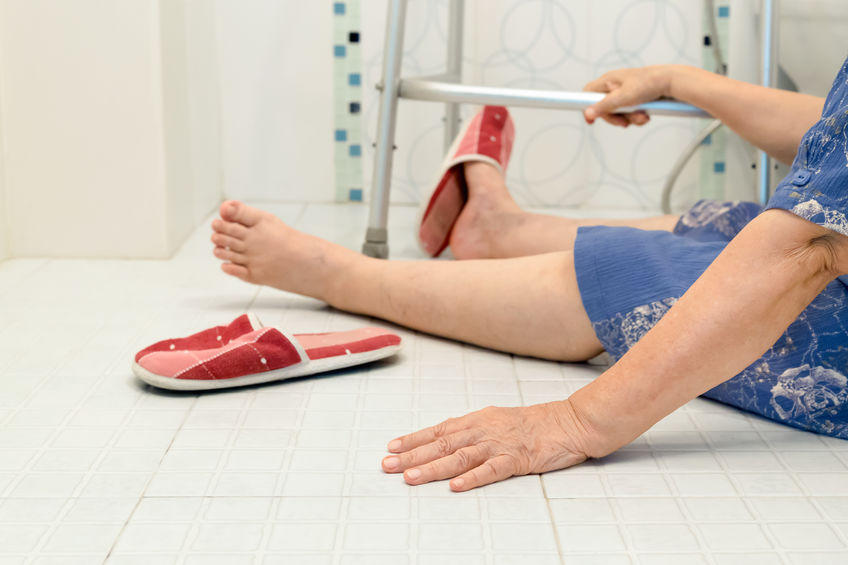When Senior Falls Can Be Fatal
March 31, 2020 | Category: Nursing Home Neglect/Abuse, Slip and Fall Accidents | ShareThe Journal of the American Medical Association (AMA) published an article titled Mortality From Falls Among US Adults Aged 75 Years or Older (2000-2016). The article said, “In the United States, an estimated 28.7% of adults aged 65 years or older fell in 2014. Falls result in increased morbidity, mortality, and health care costs. Risk factors for falls include age, medication use, poor balance, and chronic conditions (ie depression, disbetes). Fall prevention strategies are typically recommended for adults older than 65 years.”
 In June 2019, HealthDays said, “Deaths from falls are increasing sharply among …elderly Americans... Nearly … 25,000 people 75 and older died as a result of falls in 2016 -- almost three times as many as in 2000. And experts warn that the toll is likely to rise along with population shifts.”
In June 2019, HealthDays said, “Deaths from falls are increasing sharply among …elderly Americans... Nearly … 25,000 people 75 and older died as a result of falls in 2016 -- almost three times as many as in 2000. And experts warn that the toll is likely to rise along with population shifts.”
Centers for Disease Control and Prevention (CDC) Researcher Robin Lee said the price tag associated with the epidemic is estimated at $50 billion per year, and we can expect more hospitalizations and nursing home admissions as a result of falls.
The National Council on Aging recommends healthcare providers work with their patients to minimize their risk of falling by:
- Screening patients by asking whether they have fallen in the past year, feel unsteady, or worry about falling.
- Reviewing patients’ medications and stopping, switching or reducing the dose of drugs that increase the risk for falls.
- Recommending daily Vitamin D with calcium.
Falls are the number one cause of injuries in seniors, which result in hip fractures, cuts and even serious head and brain injuries that can be fatal.
Everday Health reports that senior care experts offer the following advice for preventing home falls:
- Clean up clutter. The easiest method for preventing falls is to keep your home neat and tidy. Remove all clutter, such as stacks of old newspapers and magazines, especially from hallways and staircases.
- Repair or remove tripping hazards. Sometimes home fixtures can contribute to falls, which can then lead to back pain and other injuries. Examine every room and hallway, looking for items such as loose carpet, slippery throw rugs, or wood floorboards that stick up. Then repair, remove, or replace those items for more effective fall prevention.
- Install grab bars and handrails. These safety devices are crucial for going up and down stairs, getting on and off the toilet, and stepping in and out of the bathtub without injuring yourself. Gary Kaplan, DO, founder and medical director of the Kaplan Center for Integrative Medicine in McLean, Virginia, suggests installing grab bars by toilets and bathtubs and handrails in stairways and hallways. Have a handyman or family member help with this, if necessary.
- Avoid wearing loose clothing. You want to feel comfortable at home, but baggy clothes can sometimes make you more likely to fall. Opt for better-fitting and properly hemmed clothing that doesn’t bunch up or drag on the ground.
- Light it right. Inadequate lighting is another major hazard. To create a home that’s more suitable for the elderly, install brighter light bulbs where needed, particularly in stairways and narrow hallways. Robert Bunning, MD, associate medical director of inpatient services at MedStar National Rehabilitation Hospital in Washington, D.C., also recommends adding night-lights in bedrooms and bathrooms for better guidance at night.
- Wear shoes. Socks may be comfortable, but they present a slipping risk. Preventing falls at home can be as simple as wearing shoes. You can also purchase non-slip socks that have grips on the soles of the feet if shoes are too uncomfortable.
- Make it nonslip. Bathtubs and showers, as well as floors in kitchens, bathrooms, and porches, can become extremely dangerous when wet. To prevent falls on slick surfaces, Dr. Kaplan recommends nonslip mats.
- Live on one level. Even with precautions like guardrails, stairs can present a significant falling hazard. “If possible, live on one level,” says Kaplan. “Otherwise be extra-careful when you negotiate stairs.” If it’s not possible to live on one level, try to limit the trips you take up and down the stairs.
- Move more carefully. Dr. Bunning explains that many people fall at home by moving too quickly from a sitting to a standing position and vice versa. Preventing falls like this is as easy as taking your time. “All you have to do is pause after going from lying down to sitting and from sitting to standing,” he says. “Also take a pause before using the railing on stairs, whether going up or down.”
“Elderly falls can change lives forever. If you or a loved one is injured, please contact Spivey Law Firm, Personal Injury Attorneys, P.A. We are available 24/7, and there are no costs or attorney fees until we receive a monetary recovery for you,” said Fort Myers Slip and Fall Attorney Randall Spivey.
Fort Myers Slip and Fall Attorney Randall L. Spivey is a Board Certified Trial Attorney – the highest recognition for competence bestowed by the Florida Bar and a distinction earned by just one percent (1%) of Florida attorneys. He has handled over 2,000 personal injury and wrongful death cases throughout Florida. For a free and confidential consultation to discuss your legal rights, contact Spivey Law Firm, Personal Injury Attorneys, P.A., in Lee County at 239.337.7483 or toll-free at 1.888.477.4839, or by email to Randall@SpiveyLaw.com. Visit SpiveyLaw.com for more information. You can contact Spivey Law Firm, Personal Injury Attorneys, P.A.in Charlotte County at 941.764.7748 and in Collier County at 239.793.7748.

